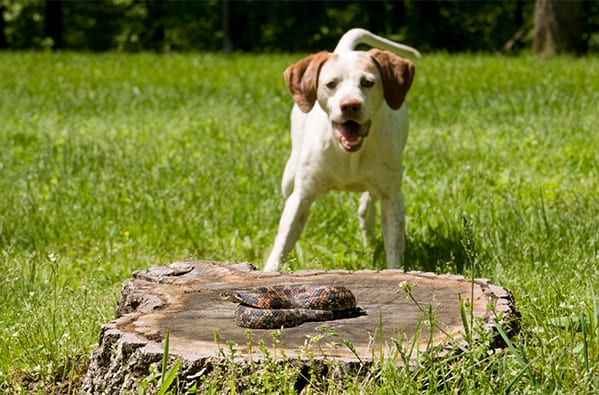How to Keep Your Dog and Cat Safe in Rattlesnake Country

Rattlesnakes play an important role in our ecosystem, but if you’re a pet owner, beware! Rattlesnakes can be deadly for pets. While not usually aggressive, they may lash out if approached or accidentally touched. Dogs and cats are often naturally curious about their surroundings and about other animals. Getting close to sniff a rattlesnake can put their life at risk. Rattlesnakes are highly venomous and have natural camouflage that allows them to blend in almost completely with their surroundings.
Preventing a Rattlesnake Encounter
When taking your pet outside, it’s essential to consider the risks and do whatever you can to minimize those risks.
- When walking your pet along trails or elsewhere through rattlesnake country, make sure they are on a sturdy leash and well under your control. Retractable leashes are dangerous because they can allow your pet too much free rein to explore places they shouldn’t, and they can sometimes break and prevent you from retracting the leash to a shorter length.
- Stick to frequently-used trails only, which are often more clear of brush, rocks, and other great hiding places for rattlesnakes.
- Try to do most of your hiking with your pet during rattlesnake hibernation season.
- Steer clear of areas with tall grasses, weeds, and heavy underbrush.
- Avoid walking your pet when it’s dark.
- Watch where you and your pet are stepping.
- Avoid turning over rocks or logs on the ground.
Signs Your Cat or Dog Has a Rattlesnake Bite
If by chance your cat or dog should encounter a rattlesnake and get bit, they could have:
- Trouble breathing/abnormal breathing
- Bruising
- Bleeding
- A swollen airway and/or swelling of the bite area
- A faster respiratory rate
- Injury of the skin (sloughing)
- Organ failure
- Low blood pressure
What to Do if Your Cat or Dog Has a Rattlesnake Bite
It’s important to know that rattlesnakes do not always rattle their tails before they attack. If your pet appears hurt or sick in any way after being outdoors with you, don’t wait—contact us immediately at (661) 799-0655 or bring in your pet for treatment. We can provide IV fluids, medication, and additional care as needed to help your pet recover. You can also contact the Pet Poison Helpline at (855) 764-7661 for advice.
Check Your Pet's Records
Look no further, PetDesk allows you to view your Pet's Health information, appointment reminders, etc.
Let's Go Shopping
Need a refill on vitamins, food, etc for your pet? Check our our online store.
Book an Appointment
Looking for Veterinary Care? Stevenson Ranch is a place that you can your pet can depend on for exceptional care.
